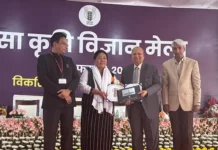[KJM Varma]
BEIJING, 22 May: Talks to resolve border issues with India and Bhutan “continue to advance,” a new white paper on China’s national security has said, identifying a host of internal and external threats faced by the country and its one-party political system.
The 23-page security paper released recently in Mandarin has outlined a host of threats and challenges faced by China.
China has settled boundary issues with 12 of its 14 land neighbours and the negotiations with India and Bhutan continue to advance to resolve the border disputes, said the white paper titled ‘China’s National Security in the New Era’.
Beijing has completed the demarcation of the Beibu Gulf waters between China and Vietnam, signed border defence cooperation agreements with nine neighbouring countries, established border defence talks and meetings mechanisms with 12 countries, and regularly carried out friendly visits, working talks, joint patrols, and joint cross-border crime drills, the paper said.
While China’s border disputes with India and Bhutan remain to be resolved, the country has a maritime dispute with several countries, including Japan in the East China Sea, and the Philippines, Vietnam, Malaysia, Brunei and Taiwan in the South China Sea.
India and China have held 23 rounds of special representatives-level talks to resolve the border disputes spanning 3,488 kms along the Line of Actual Control (LAC).
China and Bhutan held 25 rounds of talks to resolve about 400 kms of the boundary issue.
Significantly, the white paper identifies threats to the political system ruled by the Communist Party of China (CPC) headed by President Xi Jinping.
The core of political security is regime security and system security, it said.
The most fundamental thing is to maintain the leadership and ruling status of the CPC and maintain the socialist system with Chinese characteristics.
If political security is not guaranteed, China will inevitably fall into a fragmented and scattered situation, the great rejuvenation of the Chinese nation will be out of the question, and the fundamental and long-term interests of the people will not be guaranteed, it said.
It is necessary to enhance political sensitivity and political discernment, eliminate various political risks in a timely manner, and prevent non-political risks from spreading into political risks, it said.
Any attempt to separate the Communist Party from the people and to set them against each other will never succeed, the paper said.
For China, external security pressure is increasing. Western anti-China forces are doing everything they can to contain, suppress and contain China, implement different strategies against it by carrying out infiltration and sabotage activities, it said.
Foreign forces are stepping up their efforts to interfere in China’s neighbouring affairs, posing a threat to the security of China’s borders and surrounding areas, it said.
Some countries have grossly interfered in China’s internal affairs, causing trouble in the Taiwan Strait, the South China Sea and the East China Sea, and frequently causing trouble on issues related to Xinjiang, Tibet and Hong Kong, it said.
Some external forces are deliberately playing the “Taiwan card,” and the “Taiwan independence” forces are stubbornly adhering to their separatist positions and taking risks and provocations. Overseas separatist forces such as “Tibetan independence” and “East Turkestan” in Xinjiang are frequently active, it said.
While highlighting challenges China faces in the Taiwan Strait, the South China Sea and the East China Sea, besides Xinjiang, Tibet and Hong Kong-related issues, the paper has stressed the importunate of building a strong military to face the traditional and new security challenges.
On Taiwan, which China claims as part of its mainland, the paper said Beijing will never allow any person, any organisation, any political party, at any time, in any form, to separate any piece of Chinese territory from China.
“We will unswervingly promote the complete reunification of the country,” it said. (PTI)




